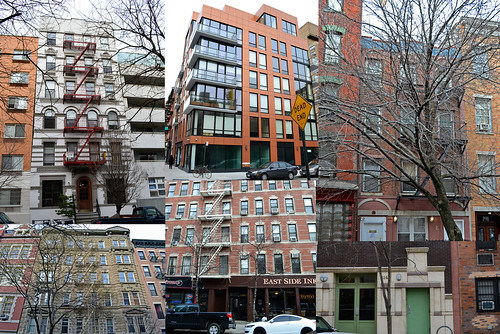It’s fun to gawk at the $3 million lofts and $4 million townhouses in Curbed’s Marketplacelistings for the East Village. Most of us can’t do much more than gawk at these palatial 3,500-square-footers unless we’re feeling very ambitious and chance a pipe dream while lying in our beds — which are conveniently five steps from the kitchen, bath, and front door in our 450-square-foot studios — wondering if today is a hot-water day or no-hot-water day.
But maybe someday we will be able to afford a less garish apartment with a more reasonable price tag. In fact, if you have the money now or in the next few years, you may want to think about making a move sooner than later. According to Tara-Nicholle Nelson, consumer educator for Trulia.com, a real estate search engine company and research group, prices and interest rates are extremely low right now and qualifying for loans will become more difficult in coming years.
We at The Local asked Ms. Nelson for a status update on the East Village market and some expert advice on buying and selling.
How has the East Village market evolved recently?
In terms of price, we’ve seen value increase over this past year. On a price per square footage basis, there’s been a 26.5 percent year-over-year increase to $1,087 per square foot from $798 per square foot.
According to Trulia.com, the average price per square foot in New York City’s is $1,190.
How often do properties sell?
So far this year, the number of East Village homes sold has been less than or equal to ten properties each month, which is roughly on par with the pace of sales in 2010, which hovered between ten and twenty sold each month.
According to a Trulia.com study from earlier this year, it is much more expensive to own than rent in New York. Why buy in this market?
Whether owning or renting is better or worse is really an individual decision that when wisely made, incorporates many other factors than affordability. Things like an individual’s family plans, life vision, financial stability, inclination to the work of homeownership and other financial factors like income and tax issues come into play.
What advice would you give to someone who is looking to buy?
It has become much less expensive to own over the last few years than it was at the peak of the market, so for renters who want to own, can afford to, and desire to stay in New York for at least five to seven years, this might be a great time to consider buying, while prices and interest rates are extremely low. Recent proposals to phase-out Fannie Mae and Freddie Mac over time will likely result in a mortgage market where qualifying for a loan will become much, much more difficult and costly in a five to seven year time frame. So renters who have a strong interest in buying would do well to get activated on their home-buying plans now.
How about for someone looking to sell?
Pricing at or even slightly below the recent sales of comparable units in the area is a very smart strategy for attracting qualified buyers, but it is even more imperative now than ever to get the advice of a local broker, who has a strong track record for getting nearby homes sold, on pricing, staging and making your home accessible for showing. I do not recommend that sellers spend a lot of time or effort trying to time the market—if you need to sell or want to sell, move forward on that path, get advice from a neighborhood broker you trust—and then, take it.
Where do you see the market going?
There are a large number of affluent households who can and will buy homes in New York in any economic climate. This keeps the bottom from completely falling out from under home prices in New York and in the East Village, making New York City real estate a sound investment compared with homes in other areas of the country.
Comprehensive real estate information about the East Village is available at the following links:




